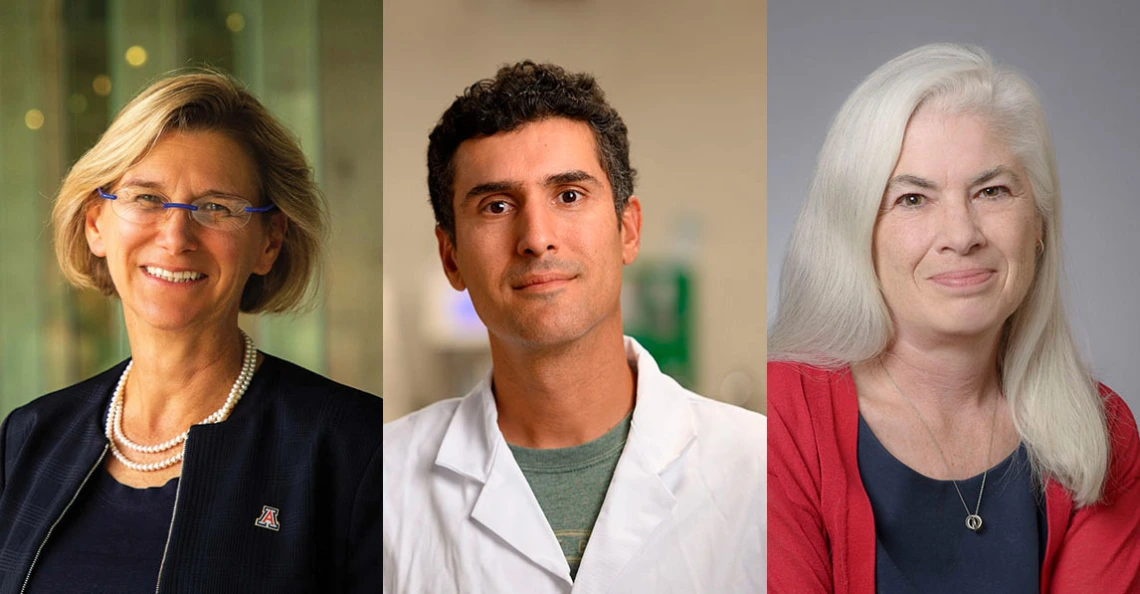AAAS includes three Engineering faculty in 2024 class of fellows
The national association recognizes scientific excellence and service.

(From left) College of Engineering professors Liesl Folks, Armin Sorooshian and Jill C. Tardiff are among the 471 scientists, engineers and innovators recently elected to AAAS fellowship.
The American Association for the Advancement of Science announced its 2024 class of fellows on March 27. AAAS, the world's largest general scientific society and publisher of the Science family of journals, included four University of Arizona faculty members. Three were College of Engineering professors: Liesl Folks, Armin Sorooshian and Dr. Jill C. Tardiff. The association also selected the U of A’s Luciano M. Matzkin, a professor in the Department of Entomology.
AAAS will host a forum to recognize the fellows in Washington, D.C., on June 7.
Fellows embody scientific excellence and service to communities, said Sudip S. Parikh, AAAS chief executive officer and executive publisher of the Science family of journals.
“At a time when the future of the scientific enterprise in the U.S. and around the world is uncertain, their work demonstrates the value of sustained investment in science and engineering,” said Parikh.
Liesl Folks: devices, measurement and the semiconductor pipeline
Folks is a professor of electrical and computer engineering and the founding director of the university’s Center for Semiconductor Manufacturing. She was selected in recognition of her contributions to magnetic materials and devices; the measurement of structures at the nanometer scale, which is one-billionth of a meter; and devices that exploit the spin property of electrons to improve performance in computing and memory, said AAAS.
"It is a great honor to be elected as a fellow of the AAAS, which is a powerful voice for the role of science in society and for the scientists who are working to advance knowledge across the disciplines," Folks said.
Folks spent 16 years in Silicon Valley in research and development. Recently, she has focused on strategies for assuring resilience of the supply of semiconductors for the U.S. and other nations.
From 2019 to 2023, Folks served as U of A provost before taking on the role of vice president for semiconductor strategy and founding CSM.
Folks has been a dedicated mentor to women and underrepresented groups in science, technology, engineering and math for many years and has advocated for broadening participation in STEM. She also was elected the first female president of the IEEE Magnetics Society.
Armin Sorooshian: aerosols and air quality
A professor of chemical and environmental engineering and University Distinguished Scholar, Sorooshian is recognized for contributions to the fields of atmospheric chemistry and environmental engineering, particularly for innovations of tools and methods to measure aerosol and clouds and their impact on air quality.
Sorooshian joined the U of A faculty in 2009. He led a major NASA mission called ACTIVATE, for which he coordinated a team of over 130 people from various institutions. ACTIVATE researchers conducted research flights across three years over the northwest Atlantic to study particle-cloud interactions.
Sorooshian also leads ozone research. His team is addressing Arizona's persistent ground-level ozone problem, particularly in Maricopa County.
"I got into this occupation because of my passion for teaching and advising, something that keeps me going," Sorooshian said. "I love the opportunity to get students excited about research with fieldwork."
Jil C. Tardiff: solving cardiac mysteries
Tardiff is a professor of biomedical engineering who maintains an active clinical practice and has a secondary appointment in the College of Medicine – Tucson. Since 2012, she has held the Steven M. Gootter Endowed Chair for the Prevention of Sudden Cardiac Death at the U of A.
Tardiff's career has focused on understanding the underlying molecular mechanisms of hypertrophic cardiomyopathy, a disease that can result in heart failure and sudden death.
"One of the greatest mysteries of hypertrophic cardiomyopathy has always been understanding how genetics result in this complex progressive disorder that has a risk of sudden cardiac death," Tardiff said.
Tardiff also investigates proteins that are crucial for heart muscle contraction. Her collaborative research with Steven D. Schwartz, a Regents Professor in the Department of Chemistry and Biochemistry, has resulted in a novel, comprehensive approach to studying the dynamic effects of mutations in heart muscle fibers. This work has paved the way for developing new methods to test potential drugs for hypertrophic cardiomyopathy.
Read the full story at University of Arizona news.

